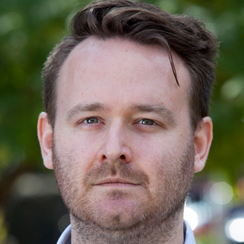 Dr Ryan Essex is a Research Fellow with the Institute for Lifecourse Development, he has several interests related to justice and health and his past work has focused on detention in Australia. His current work is largely focused on activism in health.
Dr Ryan Essex is a Research Fellow with the Institute for Lifecourse Development, he has several interests related to justice and health and his past work has focused on detention in Australia. His current work is largely focused on activism in health.
Contributions to the Sustainable Development Goals:
Ryan's work supports SDGs 3 - Good Health and Well-being, 10 - Reduced Inequalities and 16 - Peace, Justice and Strong Institutions.
Activism in health and healthcare
How should the healthcare community respond to some of the most pressing global challenges faced today? In the last few years alone doctors in the UK have turned to civil disobedience seeking action on climate change, healthcare workers in Hong Kong have played an important part in pro-democracy protests while doctors in the US have been arrested for protesting the healthcare provided to migrants on the southern border. While activism in health has been remarkably common and while it can be credited with a range of important gains, it has received virtually no attention in academic circles.
Many fundamental questions remain; what is resistance or activism in health and healthcare? When is it justified? When is action successful? If the healthcare community is to continue to play a role in challenging injustice and in addressing issues such as climate change, engaging with these questions will be critical.
This body of work has several strands of ongoing investigation:
The impact of strike action in healthcare: This body of work seeks to understand the impact of strike action in healthcare and develop a deliberative framework to assess whether strike action can be justified.
Tracking health protest: This collaborative project with colleagues in FLAS seeks to identify and track global health protest, collating these on an online platform.
Health worker perceptions of non-violent resistance: Partnering with Medact this project seeks to understand how healthcare workers understand non-violent resistance and its justification.
Theoretical, conceptual and normative development: Beyond the empirical work above, there has been ongoing theoretical, conceptual and normative work to develop a number of concepts related to activism in health.
Building connections and community: Several partnerships are being developed with health workers, activists and charities to apply and expand this work, drawing together a community of health activists.
Our Commitment to Sustainability
Here at Greenwich we recognise our responsibility for ensuring we deliver sustainability across our teaching, research and operations and this is reflected in our university Strategy 2030. In June 2020, we also committed our teaching staff to include sustainability in their programmes. This is included in the Curriculum Framework.
Our Global Responsibility
The 2030 Agenda for Sustainable Development, adopted by all United Nations Member States in 2015, provides a shared blueprint for peace and prosperity for people and the planet, now and into the future. At its heart are the 17 Sustainable Development Goals (SDGs), which are an urgent call for action by all countries - developed and developing - in a global partnership. They recognize that ending poverty and other deprivations must go hand-in-hand with strategies that improve health and education, reduce inequality, and spur economic growth – all while tackling climate change and working to preserve our oceans and forests. - Source United Nations

